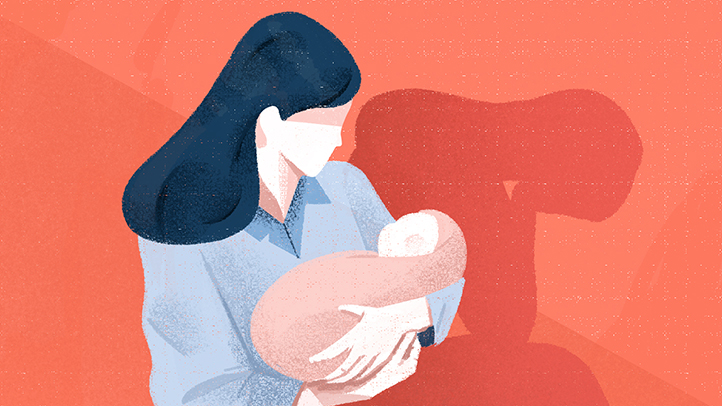
The world outside was bathed in the golden hues of sunrise, starkly contrasting the storm raging within. I was a mother, a title once synonymous with joy, now burdened by an invisible weight. Postpartum depression had crept into my life, turning the once-familiar into a labyrinth of despair.
She had waited for this moment for nine long months. The sweet smell of her newborn, the tiny fingers clutching her own, the soft, sleepy cooing. It was supposed to be the most magical time of her life. But instead, a heavy blanket of sadness had settled over her, smothering her anticipated joy.
Sleep, once a welcome respite, now felt like a battle. No matter how many hours she drifted off, exhaustion still lingered. The once vibrant world had lost its colour. Simple pleasures like walking in the park or chatting with a friend now seemed like impossible tasks. Her appetite had become a rollercoaster. One day, she’d devour everything in sight; the next, she’d barely touch a bite. The fluctuations in her weight only added to her growing sense of self-loathing.
Nights were a torment. She’d toss and turn, her mind racing with worries and fears. Days were a blur. Focusing on tasks became a Herculean effort, her thoughts scattered like leaves in a storm. Physical symptoms crept in, adding to her misery. Headaches, aches, and digestive problems made her feel like she was fighting a losing battle. And then there were the thoughts, the dark, intrusive thoughts that whispered doubts about her ability to be a good mother or the ability to survive.
Postpartum depression is a common mental health condition that can affect women after childbirth. It’s more than just the “baby blues,”. It is the feeling of sadness or mood swings that many women experience in the first few weeks after giving birth. Postpartum depression is a more severe form of depression that can last for weeks, months, or even years.
One of the most challenging aspects of postpartum depression is the constant feeling of being overwhelmed.
New mothers are already dealing with the physical and emotional demands of caring for a newborn, and the added stress of postpartum depression can make it seem impossible to cope. They may feel like they are failing as mothers and that they are unable to provide the love and care that their babies need.
Becoming a new mom is a beautiful and life-altering experience. However, it can also be overwhelming and emotionally challenging. Postpartum blues and depression are everyday experiences that many women face. Here are some tips to help you navigate this time with grace and resilience:
- Plan Your Post Pregnancy Well in Advance
- Before your little one arrives, create a peaceful, organized space that feels like your sanctuary.
- Enlist the help of family or friends to provide practical assistance and emotional support.
- Get Help from Family Members and Doctors:
- Develop a trusting relationship with your healthcare provider, who can offer guidance and reassurance throughout your pregnancy and postpartum journey.
- Immerse yourself in books and online resources about childcare. Feel free to seek advice from experienced mothers and elders.
- Express your feelings openly with your friends and family, discuss issues bothering you with elders, and find practical solutions.
- Nourish yourself:
- Daily exposure to sunlight helps regulate mood and energy levels.
- Fuel Your Body: Prioritize a diet rich in omega-3 fatty acids (found in oily fishes like sardines, salmon, flax seeds, chia seeds and flaxseeds) and riboflavin (found in eggs, organ meats (kidneys and liver), lean meats, and milk, Almond, cheese, mushroom, apples, spinach), essential nutrients for brain health and overall well-being. Consider dietary supplements if needed.
- Regular exercise, even gentle walks or yoga, can boost your mood and energy.
- Enjoy your breastfeeding time by choosing a posture that is convenient for you. Use this time to bond with your baby in the best possible way. Cuddle your baby often to release oxytocin, the “love hormone,” which promotes bonding and relaxation.
- Self-Care is Essential: Schedule a regular time for yourself to unwind and recharge. Whether it’s a relaxing bath, a walk in nature, or simply reading a book, prioritize self-care.
- Take frequent naps in the day.
- Try to have at least 4 hours of continuous sleep at night.
- Take out some me time once or twice a week and unwind in the way you feel like. Watch a movie, meet friends, spend time with your spouse, groom yourself, massage, or go shopping.
- Spend quality time with your spouse as much as possible.